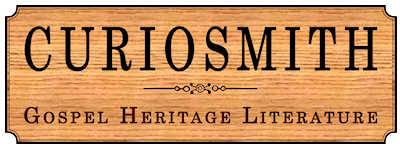
Thursday, October 29, 2009
Wednesday, October 28, 2009
Valley of Humiliation
Tuesday, October 27, 2009
Monday, October 26, 2009
The Armory
"This was the basis of another day’s instruction. Here was the receptacle containing the weapons of the spiritual warfare. All the parts of the Christian panoply—'the whole armor of God'—are supplied from this store-house. And there is no stint or sparing of the supply; yea, though the host should be as the stars of heaven for multitude, there is enough for each, and enough for all, and yet to spare. Out of these supplies was CHRISTIAN himself armed and equipped ere he departed from the Palace on his homeward way.
This armory, moreover, served as a museum, or treasury of those ancient implements of the good fight of faith, by which men in olden time did fight and win their spiritual battles. These relics—not for worship, but for remembrance, were evidences of the might of other days, when the strong champions of the Lord went in and out among their people, and were jealous for Jehovah’s sovereignty, and avenged his righteous cause against all opposers. This was just such a treasury of ancient lore and deeds of faith as Paul supplies in the eleventh chapter of his Epistle to the Hebrews—that memorable record of men that lived and died in faith."[1]
Friday, October 23, 2009
Wednesday, October 21, 2009
The Study
Tuesday, October 20, 2009
Wednesday, October 14, 2009
Charity
"CHARITY endears the members one to another!”[1]
"CHARITY continues the communion and fellowship of heart with heart. She inquires about his home and family, and how it is they have not joined him in his pilgrimage, and whether blame attaches to him for any neglect on his part of their spiritual interests. To all these inquiries CHRISTIAN answers truthfully and well. His wife would not resign the world and the pleasures of the world; and his children would not surrender the pleasures of youth; and thus did the spell of worldliness bind them to carnal things."[1]
Discretion
"DISCRETION governs"[1]
"The introduction of the Pilgrim to the palace devolves upon DISCRETION, who also conducts the preliminary conversation. She ascertains the past history of CHRISTIAN—whence he has come, and whither he is going. He is also straitly questioned as to how he entered the way; for none can be made partakers of the blessedness of that fair house and of its goodly company, but they who have entered by the Wicket-gate. Last of all, she inquires his name. Names are no passport in spiritual things; it is the inward man, and not the outward name, that ensures admittance to the true fellowship of the saints and of the household of God. Therefore, not the first, but the last of the questions, is that concerning the Pilgrim’s name."[1]
Piety
"In the conversations that ensue, PIETY is the first to speak. She inquires into the inward motives that prompted the Pilgrim to this pilgrimage. CHRISTIAN’S answer to this inquiry opens up afresh the memory of his flight from the City of Destruction. He tells of the 'dreadful sound' by which he was 'driven out' of his native land. Wrath from without, conviction from within, and both these working upon conscience—deep calling unto deep—created that “dreadful sound,” so that the man was 'driven' to flight. The further questions proposed by PIETY reproduce the narrative of the preceding scenes of the pilgrimage, including the Wicket-gate, the illustrations of the Interpreter’s House, the sight of One who did hang bleeding upon a tree, the tokens and credentials given him at the Cross, and the unworthy companions that met him on the way. Then the Pilgrim reports progress, and explains his past experiences."[1]
Tuesday, October 13, 2009
Prudence
"She enters not so much into the motives and feelings of the past, as into his thoughts and feelings for the present—those inward phases of the soul’s reflection, when, having forsaken the old things, a new life is to be lived, on new and better principles. It is important we should ourselves inquire whether any vain regrets intertwine themselves with our present obedience; whether an earnest strife is waged against the carnal thoughts that rise within us; and whether that strife is crowned with victory, so that carnal things are 'vanquished,' and die within us."[1]
Monday, October 12, 2009
Hypocrisy
Formalist
Wednesday, October 7, 2009
Two Lions
Many apparent spiritual dangers seem formidable until they are more closely examined by the eye of faith and with confidence in God. Ignorance ofttimes exaggerates threatening danger, as it sees not and knows not the restraining power of Divine grace. MISTRUST and TIMOROUS could not tell whether the lions were 'sleeping' or 'waking;' the very sight of the lions in the distance alarmed them. CHRISTIAN’S ignorance, too, had well nigh driven him back; for 'the lions were chained, but he saw not the chains.' It was the kind and timely voice of the porter, WATCHFUL, that dispelled his fears by dispelling his ignorance, informing him that these lions were for the probation of faith, and would be harmless if he would only walk in the middle of the path.
How greatly do these messages of God’s ambassadors strengthen the pilgrims of Sion and embolden them in the midst of danger! Here were rampant, roaring lions; not asleep, but awake, in a narrow passage, and very near; but they were 'chained.' This announcement makes all the difference. MISTRUST and TIMOROUS might also have heard the good Porter’s news, only they came not near enough, but fled at the first view of the seeming danger. Suspicion is the child of little knowledge; therefore let it know more, and see more thoroughly. Knowledge looks with open face, and therefore sees all things plainly."[1]
Friday, October 2, 2009
Palace Beautiful
Sources
2. John Bunyan, The Pilgrim's Progress.
Illlustrations
1. Henry Courtney Selous (1803 - 1890).
2. M. Paolo Priolo.
Engravers:
1. William James Linton (1812 - 1897).
2. Léon Louis Chapon (1836 - 1918).







